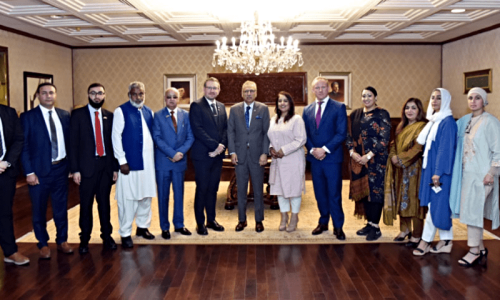UNITED NATIONS: Pakistan raised the situation in Indian-held Jammu and Kashmir before the UN Decolonisation Committee, characterising India’s unilateral actions in the occupied territory as a modern-day colonial project.
The UN body, which is also known as the ‘fourth committee’, began a general debate on freedom from foreign occupation at the UN headquarters in New York on Monday.
Several member states participated in the debate, emphasising the need to resolve the questions of the 17 Non-Self-Governing Territories, more than six decades after the UN General Assembly adopted the Declaration on the Granting of Independence to Colonial Countries and Peoples.
Pakistan’s UN envoy Munir Akram urged India to create conditions for dialogue — and for the United Nations and its member states to promote a peaceful settlement in accordance with relevant UN resolutions and the wishes of the Kashmiri people.
Munir Akram urges New Delhi to create conditions conducive to dialogue
The declaration, also known as the United Nations General Assembly (UNGA) Resolution 1514, was passed during the assembly’s 15th session. It characterises foreign rule as a violation of human rights, affirms the right to self-determination, and calls for an end to colonial rule.
President of the General Assembly, Dennis Francis, said the Fourth Committee’s work was crucial to cultivate trust in the United Nations at a time when “the multilateral system and its institutions are descending even deeper into a credibility crisis”.
Ambassador Akram welcomed the committee’s recommendations and its request for the Secretary-General to explore innovative approaches to advance the decolonisation agenda.
Expressing regret that “there are still people who are denied the right to self-determination”, he highlighted the situations in Jammu and Kashmir and Palestine, and supported the demand for a two-state solution in the Middle East.
He characterised India’s unilateral steps in the occupied territories as “a modern-day colonial project that includes human rights abuses, extrajudicial killings and demographic changes”.
“India is pursuing a Hindu-majority agenda in a Muslim-majority area,” he said, citing the issuance of fake domicile certificates and land confiscations.
Urging India to take steps to create conditions for dialogue and resolution of the Jammu and Kashmir dispute, including an end to human rights violations and demographic changes, Ambassador Akram called on the United Nations and its member states to “promote a peaceful settlement in accordance with relevant UN resolutions and the wishes of the Kashmiri people”.
Since 1946, 80 former colonies have gained independence. “Yet, there are people who are still denied the right to self-determination, most prominently the people of occupied Jammu & Kashmir and Palestine,” he said.
“Pakistan believes that durable peace in the Middle East can only be achieved through the two-state solution and the establishment of a viable, independent and contiguous State of Palestine, with the pre-1967 borders, with Al-Quds Al-Sharif as its capital.”
The Indian occupation of Jammu & Kashmir, he added, “is the worst manifestation of modern-day colonialism”.
He pointed out that the right of self-determination of the people of Jammu and Kashmir was explicitly recognised in UN Security Council Resolution 47 and several later resolutions, which prescribed that the final disposition of the State of Jammu and Kashmir, should be decided by its people through a free and fair plebiscite held under UN auspices.
Even though both India and Pakistan accepted these resolutions, “for more than 75 years, through force and fraud, India has avoided the implementation of these resolutions,” he said. Since 1989, India’s brutal repression in occupied Jammu and Kashmir has killed more than 100,000 Kashmiris, he added.
Ambassador Akram informed the committee members that since Aug 5, 2019, India has taken unilateral and illegal steps to annex occupied Jammu and Kashmir and “Kashmir today is the most densely occupied place in the world, with more than 900,000 Indian occupation troops deployed there”.
The Indian occupation forces, he said, had perpetrated a vicious campaign of extrajudicial killings in fake encounters and abductions and enforced disappearances of 13,000 young Kashmiri boys. “The entire genuine Kashmiri leadership has been incarcerated since 2019. Several leaders have died in Indian custody,” he added.
Published in Dawn, October 4th, 2023















































Dear visitor, the comments section is undergoing an overhaul and will return soon.